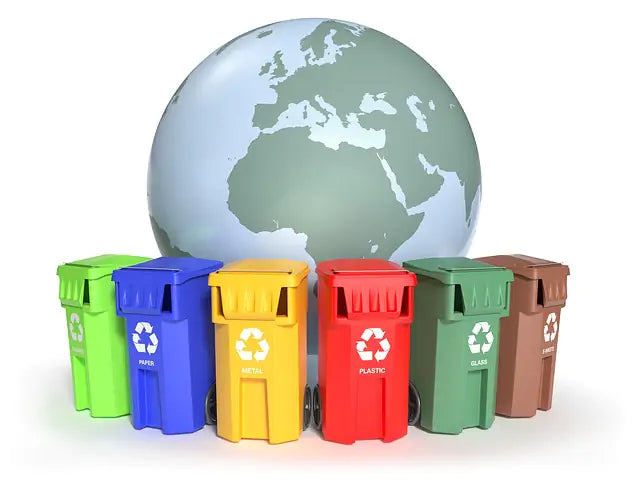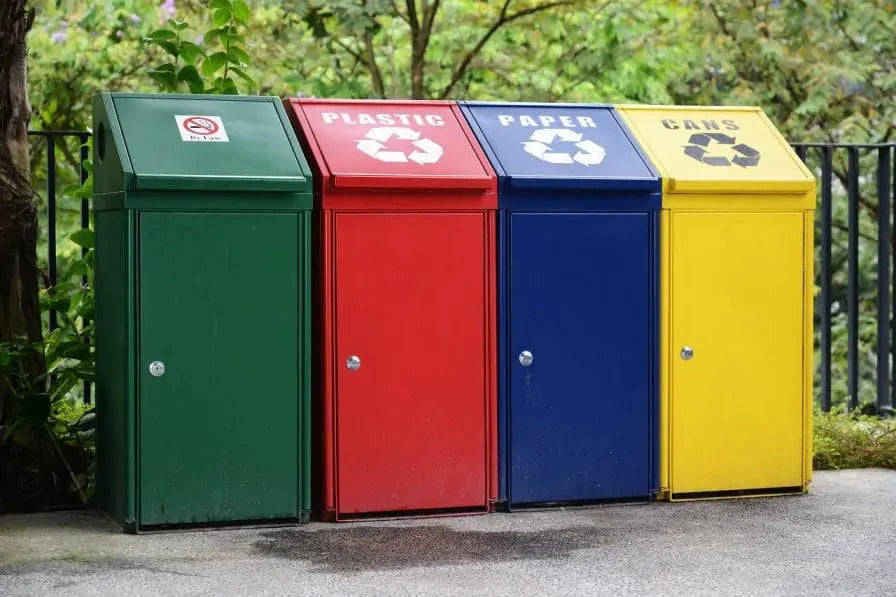Your basket is currently empty.
Shop NowRecycling Bin Colours In The UK

In a world where we are all encouraged to Reuse, Reduce, and Recycle, recycling has become part of daily life, but with so many different recycling bin colours in the UK to choose from, the whole process can be confusing.
While most of us have figured out how to recycle plastic bottles, aluminium cans, paper, glass, and garden waste, what on earth does one do with old lightbulbs, aerosols, and nappies? Here we take a look at Recycling Bin Colours in the UK, and what you should be putting in them, and more importantly perhaps, what you should not.
Recycling Facts in the UK
According to statistics released by DEFRA, we recycled 45.2 per cent of all household waste in the UK in 2017, which is an increase of 0.3 per cent on the previous year. While the figures are improving year after year, we still have a long way to go if we are to reach the EU target of recycling 50 per cent of all household waste by 2020, but it seems many of us are discouraged from recycling due to a lack of information on what we can put in our recycling bins and what we cannot.
While there is no universal rule on recycling bin colours, many city councils across the UK have adopted the same rules to keep things simple. Most British households have a black wheelie bin, a blue recycling bin, a brown recycling bin, and a green recycling bin or container. However, you may have a red bin rather than a blue bin or a grey bin rather than a green bin, so please bear with us, and we’ll do our best to explain!

What Goes In What Bin: Recycling Bin Colours Explained
Black Rubbish Bins / Recycling Bins
In many parts of the UK, black wheelie bins are for general waste that cannot be recycled or composted. If this is the case in your area, you can use these bins for all non-recyclable household waste, including food waste, if you do not have a separate waste food container.
However, if you have a Black Recycling Bin or Box, then you should use it to collect plastic bottles, pots, tubs, and trays, food and drinks cans, the metal lids from jars, tins, empty aerosols, foil containers and lids, kitchen foil, and foil chocolate wrappings.
There are exceptions as to what you can put in your black wheelie bins and your black recycling boxes, so ask your local council for a full list of exclusions or check their website.
Blue Recycling Bins
Blue recycling bins are most commonly used in the UK to collect ‘dry’ recyclables, such as:
- Paper
- Newspapers & magazines
- Cardboard
- Junk mail
- Telephone books & catalogues
- Cereal boxes (without the plastic liner)
- Egg boxes
- Greeting cards
- Drink and food cans
- Biscuit tins
However, some councils use red recycling bins instead of blue recycling bins, while others issue both colours, so check with your local authority if you are unsure.
Red Recycling Bins
As a general rule, red recycling bins are used for plastics, although many councils will allow you to collect plastics in your ‘dry’ recycling bin, whatever colour it may be. If you have a red recycling container, you can use it for the following:
- Plastic bottles
- Food trays / plastic punnets
- Yoghurt pots (without the lid)
- Empty shampoo and cleaning product bottles
However, all plastics are not made equal, and this is where many people get confused. The following items cannot be recycled and should be disposed of in your black wheelie bin and not your red recycling bin:
- Plastic carrier bags
- Plastic wrapping and packaging
- Hard plastics such as flowerpots and coat hangers
- Polystyrene
- Black plastic trays
Brown Recycling Bins
If you are lucky enough to have a brown recycling bin, then you are probably wondering what all the fuss is about. Across the country, brown recycling bins are for mixed recyclables such as:
- Plastic bottles
- Food tins
- Drinks cans
- Aerosols
- Tin foil (including trays)
- Glass bottles and jars
But, not everywhere! In certain parts of the country, brown recycling bins are for organic garden waste and food waste only. Confused? Us too! But again, you can easily access information about this online.
Green Recycling Bins
Green recycling bins, not to be confused with green garden waste wheelie bins, are generally used to collect glass recyclables such as glass bottles and jars, although many councils use green recycling bins for dry recyclables too.
If you have a green food waste recycling container, then you should use it for all general household food waste such as:
- Fruit and vegetable peelings
- Cooked food leftovers
- Meat bones
- Fish bones
- Eggshells
- Teabags
- Coffee grounds
The benefits of recycling food waste are well-documented, and by diverting organic materials from the landfill, and converting it into energy and fertilizer, we can reduce our CO2 footprint.
Yellow Recycling Bins
Yellow recycling bins are used to collect textiles such as clothes, bed linens, and towels. You most likely won’t have one of these at home, but you will find them at your local recycling bank. Textile recycling bins are sometimes orange in colour, but they are usually clearly marked and easy to identify due to their unique apertures.
Grey Recycling Bins
When it comes to Grey Recycling Bins, well, it’s a grey area. Some councils use them for general household waste instead of black wheelie bins, while others use them for ‘dry’ recyclables such as paper and food cans or mixed recyclable waste. Check with your local authority.
Purple Recycling Bins
Purple recycling bins are popping up all over the country, but as they are still new in the world of recycling, it seems no-one can decide what to do with them. In Liverpool, for example, you’ll use your purple recycling bin for general household waste, food waste, and pet food, while up in Ayrshire, purple recycling bins are reserved for recyclables such as glass, plastics, cans, and cartons.

Using Your Recycling Bin Colours Correctly
With a veritable rainbow of recycling bin colours in the UK, it is easy to understand why we are all getting confused, but help is at hand. All councils provide information on what recycling bins you are entitled to, what days of the week they are collected, and what you should be putting in each bin. If in doubt, pop over to your local council’s webpage and become an eco-warrior by Reusing, Reducing, and Recycling as much as you can.






